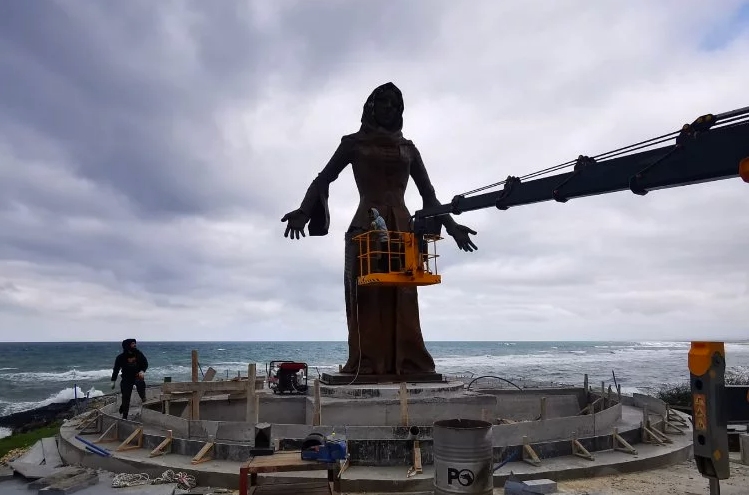A New Monument to Honour Russian-Caucasian War Victims to be Unveiled in Turkey

SUKHUM / AQW'A — On the Day of Remembrance of the Russian-Caucasian War victims, this May 21st, Turkey is set to host a formal inauguration of a new monument. The ceremony will be graced with the presence of an official delegation from Abkhazia, including parliament members and the chairman of the Republic of Abkhazia's State Committee for Repatriation.
Crafted by Assoc. Dr. Ceyhun Konak and standing on the coast of Kefken Babalı Village, the monument reaches eight metres high, with its pedestal adding another two metres to its impressive stature. The historical academic research for the project was diligently conducted by Dr. Oğuz Polatel, a distinguished instructor and researcher in the field.
Astamur Bagateliya, the deputy chairman of the Repatriation State Committee, revealed that the idea to erect a monument honouring the Mukhazhirs (exiles) had been under consideration for a long time. The project finally came to fruition with the backing of the Kocaeli municipality and the dedicated efforts of the Abkhaz Cultural Center, led by Hasan Kardiya. Both the cultural centre and the municipality have taken responsibility for the monument's associated costs.
"Transporting the monument was a complex task," admitted Bagateliya. "It had to be moved piece by piece before being reassembled at its final location, a process that required the involvement of the local gendarmerie and transportation police."

+ On the 159th Anniversary of Genocide and Exile, Circassians Proclaim: 'This is Genocide'
+ New Monument Commemorating Russian-Caucasian War Exiles to Be Unveiled in Izmit, Turkey
+ The Exodus of Abkhazians During the 19th Century: Resistance, Uprisings, and Exile
Kandıra, a town located in the same province, is the home to a cemetery commemorating the victims of the Russian-Caucasian War. Back in 2021, ABHAZFED (Federation of Abkhazian Associations) marked this area with a poignant tribute, planting an olive grove of three hundred trees in memory of the victims.
Kefken holds a significant historical significance, as it was the landing point for feluccas carrying highlanders, primarily Abkhazians, during the Russian-Caucasian War. The coastal caves served as the first refuge for these Mukhazhirs in their unfamiliar surroundings.
Faced with hardships, including hunger and disease, many succumbed and were laid to rest near the caves. These caves still bear the inscriptions of these people, dating back to 1860. Kefken also witnessed the landing of the last group of Abkhaz Mukhazhirs in 1877.
Each year on May 21, representatives of the Circassian and Abkhazian diaspora in Turkey convene at this historical site. They honour their ancestors by laying wreaths in the sea, staging theatrical performances, and holding meetings, all aimed at ensuring the younger generations remain connected to their history.
The Russian-Caucasian War came to an end on May 21, 1864, forcing thousands of Abkhaz and Circassian people forced to leave their ancestral lands and relocate to the Ottoman Empire, eventually moving on to other countries. The Day of Remembrance for the victims of the Russian-Caucasian War is observed annually by Abkhaz and Circassian communities worldwide. Today, descendants of the mukhazhirs (exiles) reside in numerous countries, with Turkey hosting the largest diaspora.
At a gathering in Sukhum, Abkhazia, on May 31, 1990, 30,000 representatives of the mountain peoples of the Caucasus unanimously passed a resolution. This resolution acknowledged May 21, 1864, the day marking the end of the Russian-Caucasian War, as a day of remembrance for the war's victims and those who endured forced deportation.